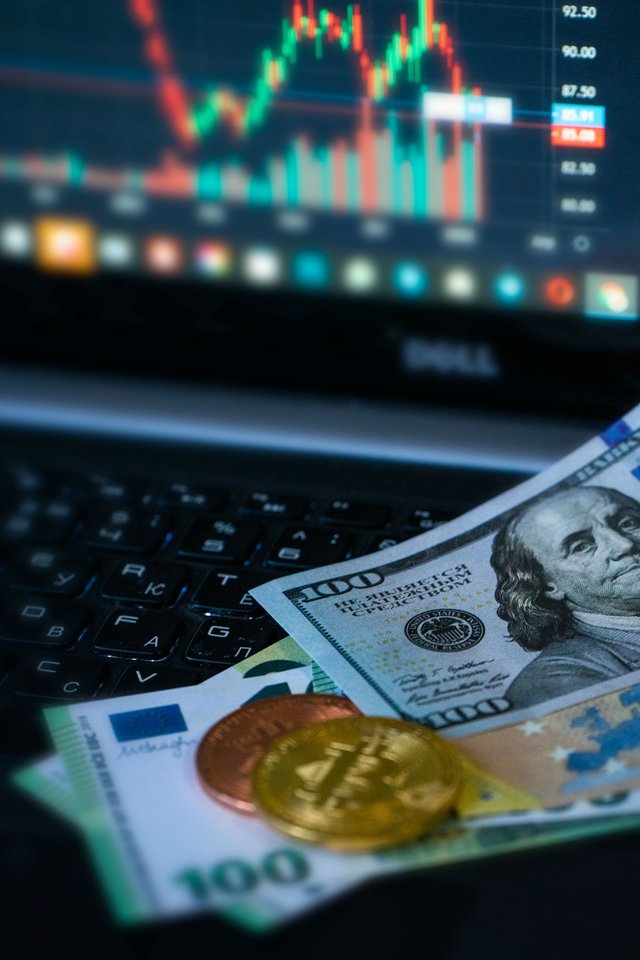Steemit Crypto Academy Contest / S4W2 - Decentralized Finance by @bdeem1
Decentralized Finance: The future of money?
 Source
SourceDecentralized finance, also referred to as "DeFi," describes the transition away from traditional, centralized financial sectors and toward decentralized, peer-to-peer money. In a decentralized system, there is no central authority; instead, the platform's network of users verifies and processes transactions. A more accessible, open, and transparent financial system is made possible as a result. DeFi platforms are created using blockchain technology, which allows them to function decentralized. They become more resistant to fraud and hacks as a result, and users have more control of data and assets. DeFi is still a young technology, yet it has the power to completely alter the financial sector.
Explain in your own words the DeFi world Why is it important? Let's talk about it.
Decentralized finance is the transition away from centralized, traditional financial systems and toward decentralized, peer-to-peer financing. A decentralized system lacks a central authority and relies on the network of platform users to verify and process transactions. This enables a financial system that is more accessible, open, and transparent. Exchanges (DEXs), stablecoins, and lending platforms are among the decentralized finance solutions together referred to as DeFi.
Why is it crucial?
Users have more authority over one‟s assets, data, and financial systems thanks to decentralized finance. Additionally, it can encourage innovation, lower entry barriers, and financial inclusivity. Increased transparency, a lesser chance of theft and manipulation, and lower entry barriers are benefits of decentralized finance. By permitting users to conduct transactions without a bank account, it encourages financial inclusion. Decentralized finance also makes it possible for anybody to establish creative services and contribute to the network through open, rule-based ecosystems.
DeFi Vs Centralized Finance. Advantages and disadvantages, let's talk about them.
Decentralized finance offers users many benefits including,
- Greater access to financial services: DeFi can give people in developing nations access to crucial financial services that they otherwise wouldn't have.
- More security and transparency: Compared to conventional financial models, blockchain technology, on which DeFi platforms are based, offers greater security and transparency.
- Lower costs: Compared to conventional financial institutions, DeFi platforms frequently charge lower fees, making them more accessible to customers.
- More democratic and decentralized: Compared to traditional finance, DeFi platforms tend to be more decentralized, giving users more control over their own finances.
- Quicker transactions: Given that most DeFi platforms are decentralized,
Decentralized finance also has some drawbacks
- Lack of Regulation: The fact that DeFi is currently unregulated is one of its drawbacks. This indicates that there are no regulations or laws in place to safeguard investors against fraud or scams.
- Unpredictable and Volatile Prices: DeFi also has the drawback of potentially unpredictable and volatile prices. This is due to the fact that the value of tokens frequently depends on rumors and enthusiasm rather than solid underlying principles.
- Hacks and Security Breaches: A third drawback of DeFi is that numerous hacks and security breaches at various exchanges and protocols in recent years have led to the loss of digital assets valued at millions of dollars.
Advantages of centralized finance
- Simple to manage: As opposed to a decentralized system, a centralized one is simpler to manage. This is due to the fact that there is only one decision-making body, which makes it easier to coordinate efforts and keep tabs on development.
- More effective allocation of resources: Because centralized systems can pool resources together, they can allocate them more effectively. For instance, a national government can construct highways that link various regions of the nation, facilitating quicker and simpler transportation.
- Greater economic control: Centralized systems have greater economic control because they can coordinate economic activity and regulate macroeconomic factors like inflation and interest rates.
Disadvantages
- Attack Vulnerable: Centralized financial systems are more susceptible to fraud and hacking than decentralized ones due to a single point of failure.
- Higher Operating Costs: Centralized financial systems are typically more expensive to run than decentralized ones, primarily because of the need to meet KYC/AML requirements and other legal requirements.
- Less Efficient: Because of the bureaucracy involved in decision-making and the lack of operational transparency, centralized financial institutions are frequently less efficient than their decentralized counterparts.
- Lower levels of security: Since all the data is kept in one location, there is always a chance that it will be stolen or hacked in a centralized system. Given that data is dispersed among numerous machines, this risk is significantly smaller in a decentralized system (nodes).
- prone to downtime: Since centralized systems have a single point of failure, they are prone to lengthy downtimes during which users are unable to access their money or conduct transactions.
Have you used decentralized Exchange? Tell your experience and explain a Decentralized Exchange. Show screenshots.
As of now I have no experience with decentralized exchange systems.
In order to do this, you must register and open an account on a DeFi exchange like Uniswap. You can trade a variety of assets, including stocks, exchange-traded funds (ETFs), cryptocurrencies, commodities, and even currencies. When comparing a centralized and decentralized exchange, you will initially notice the differences. The difference between a centralized exchange and a decentralized exchange is that the latter is more of an application where you can solely trade stocks and other financial items, while the former is more of a website where you can trade any asset.
Give us your opinion about the future of DeFi.
The field of decentralized finance is continually developing. Although technology has the potential to completely alter the way we see and utilize money, that potential is still a long way off. Before decentralized finance to advance from a promising concept to a fully-fledged, popular technology, it must overcome a number of obstacles. Decentralized finance, according to many analysts, has the ability to alter the current state of the financial services industry. The decentralized finance sector will face numerous difficulties as it expands and changes.
Let's examine decentralized finance from the perspective of each of these activities. accounts for savings. Savings accounts with interest are frequently offered by banks and other financial institutions. People can open these accounts and deposit money to obtain interest from their banks. Some people, however, are either denied the opportunity to open a bank account or opt to use decentralized savings accounts in its place. Users can deposit money into their accounts on decentralized savings systems and earn interest by lending it to other users. Anyone, including those outside of conventional financial systems, can access decentralized savings platforms because they are global and open to all.
Loaning and borrowing.
On both controlled and decentralized financial platforms, borrowing and lending are common behaviors. When determining how to borrow and lend money, individuals have additional options thanks to decentralized finance. Peer-to-peer lending is made possible by decentralized financial systems, which can let people borrow from each other instead of from big, centralized financial institutions. While raising market competitiveness, peer-to-peer lending can reduce costs. Users of decentralized lending systems can potentially generate interest by lending money to other members of the network. Peer-to-peer lending is made possible by decentralized finance, which gives consumers the option of borrowing money from their peers instead of centralized financial institutions. By cutting out the middleman, decentralized lending platforms can reduce the cost of borrowing.
Stablecoins
Because they are unstable, cryptocurrencies are inappropriate for use in routine transactions. Cryptocurrencies known as stablecoins are backed by assets like commodities or fiat money. With the use of stablecoins, cryptocurrency price volatility can be reduced. On decentralized finance networks, decentralized stablecoins are used. These stablecoins have escrow-held assets as their backing. These stablecoins are linked to the value of the underlying assets in terms of value. Because they are dispersed throughout the network, these stablecoins are transparent and less prone to fraud and hacking. Stablecoins can be used as payment on decentralized finance platforms, facilitating user transactions https:

This is one of the biggest flaws of decentralized exchange, because the price of crypto asset can be very volatile and unstable it has caused so many lose a lot of money because The price of the asset might be Lower than it's initial value when the want to use the money.
Thank you very much for sharing
wishing you success.
You are very experienced in sharing of these types of articles. Better details added for DeFi explanation, as well as detailed advantages & disadvantages of CeFi and DeFi. I was amazed when I read the very much details about future of DeFi. It's huge.
I didn't use uniswap but, I used and shared SushiSwap and there is no registration just link your wallet. Maybe registration is mandatory on Uniswap.
Okay I will take a look at SushiSwap
Yes very true, DeFi is low cost and it is different from CeFi and transactions are faster. All transactions are recorded on the Blockchain and cannot be changed.
I also shared a post about DeFi, if you have time please see it and I am very happy.
Thanks for reading and I would be glad to take a look
Thanks for the great response my friend, I'm glad to hear that and I'll be waiting for your arrival.
DeFi has gone global because of its amazing features such as security, transparency, decentralization, low fee, and quicker transaction. Just as you said that DeFi is unpredictable and one loss is inevitable because of volatility but the removal of central authority makes it more acceptable to people, also people can transact from the comfort of their home to anywhere in the country without going through any stress. Thank you for sharing.